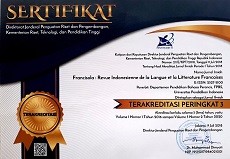« NOUS » ET LA CONSTRUCTION D’UN ETHOS INDIVIDUEL ET COLLECTIF DANS LE DISCOURS POLITIQUE
Abstract
RÉSUMÉ. La construction de l’image d’un pays ou d’une personne s’avère importante dans les échanges internationaux. Ainsi, notre étude porte sur la construction de l’ethos à la française pour mieux connaître les stratégies concernées et pour arriver à une communication efficace avec les Français à l’avenir. Le pronom « nous », considéré comme une jonction entre « je » et « non-je », demeure un marqueur important en ce qui concerne la construction d’un ethos individuel et collectif, et nous ouvre la perspective sur sa valeur stratégique dans le discours politique aussi bien que sur sa fonction dans les relations hiérarchiques des actants. Notre travail, qui étudie le duel entre Sarkozy et Hollande en 2012 pendant les élections présidentielles, est essentiellement ancré dans l’analyse du discours, dans la théorie de l’énonciation de la subjectivité (Benveniste, 1966, 1974 ; Kerbrat-Orecchioni, 2009) en particulier.
Mots-clés: discours politique, énonciation, ethos individuel et collectif, « nous », valeur stratégique.
00lns:o="urn:schemas-microsoft-com:office:office" xmlns:w="urn:schemas-microsoft-com:office:word" xmlns:m="http://schemas.microsoft.com/office/2004/12/omml" xmlns="http://www.w3.org/TR/REC-html40">
ABSTRACT. The national or personal image building is very important in international exchange. Therefore, our study focuses on the construction of ethos in a French way in order to gain a better understanding of the relevant strategies and to achieve effective communication with Frenchmen in the future. The pronoun “we”, which is supposed to be a junction between “I” and “non-I” in enunciation, is an important symbol in the construction of individual and collective ethos, and opens up the possibility to carry out a study on its strategic value in the political discourse, as well as its function in the hierarchical relationship among the participants. Our work, which is studying the duel between Sarkozy and Hollande during the presidential election in 2012, is rooted in the theory of discourse analysis, especially in the theory of enunciation of subjectivity (Benveniste, 1966, 1974; Kerbrat-Orecchioni, 2009).
Keywords: enunciation, individual and collective ethos, political discourse, strategic value, we.
Full Text:
PDFReferences
Amossy, R. (2010). La présentation de soi : ethos et identité verbale. Paris : Presses Universitaires de France.
Benveniste, E. (1966). Problèmes de linguistique générale. Tome I. Paris : Gallimard.
Ghiglione, R. (1989). Je vous ai compris ou l’analyse des discours politiques. Paris : Armand Colin.
Jereczek-Lipinska, J. (2007). De la personnalisation dans la communication politique : l’effet du « je ». Synergies Pologne, 4, 147-155.
[Le discours politique]. (s.d.). Repéré à http://analyse-du-discours.com/discours-politique.
Kerbrat-Orecchioni, C. (2009). L’énonciation. De la subjectivité dans le langage. Paris: Armand Colin.
Mayaffre, D. (2003). Dire son identité politique : Etudes du discours politique français au XXe siècle. Cahiers de la Méditerranée, 66, 247-264. Sarfati, G-E. (2005). Eléments d’analyse du discours. Paris : Armand Colin.
DOI: https://doi.org/10.17509/francisola.v1i1.2567
Refbacks
- There are currently no refbacks.
Copyright (c) 2016 FRANCISOLA
View My Stats











